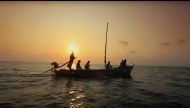IKI project impresses at GOA Carnival with 'Marine litter' float
'Kheldho' float supported by IKI's Conservation and Sustainable Management of Coastal and Marine Protected Areas (CMPA) Project steals the limelight at the Goa Carnival 2016.
 The CMPA Project implemented by Gesellschaft für Internationale Zusammenarbeit (GIZ), together with the Goa Forest Department used a float 'Kheldho' built entirely from 'marine litter' at the Goa Carnival 2016 parade to draw attention to a major threat that the world's oceans face today. Plastic, a non-degradable, man-made material, comprises a major proportion of the global marine litter. A recent study predicted that our oceans will have more plastic than fish by the year 2050.
The CMPA Project implemented by Gesellschaft für Internationale Zusammenarbeit (GIZ), together with the Goa Forest Department used a float 'Kheldho' built entirely from 'marine litter' at the Goa Carnival 2016 parade to draw attention to a major threat that the world's oceans face today. Plastic, a non-degradable, man-made material, comprises a major proportion of the global marine litter. A recent study predicted that our oceans will have more plastic than fish by the year 2050.
 The Mudskipper, a unique fish species locally known as 'Kheldho', is ubiquitous to India's estuaries and coastal mudflats, which is the habitat of most of the CMPA Project's pilot sites in the coastal states of Goa, Gujarat, Maharashtra and Tamil Nadu. The Mudskipper spends more time on land than in water and its survival is closely linked to the health of Goa's estuaries and mangroves. One of its most unique features is that it can breathe using its skin while on land. Its disappearance could signal a degradation of the regions estuaries.
The Mudskipper, a unique fish species locally known as 'Kheldho', is ubiquitous to India's estuaries and coastal mudflats, which is the habitat of most of the CMPA Project's pilot sites in the coastal states of Goa, Gujarat, Maharashtra and Tamil Nadu. The Mudskipper spends more time on land than in water and its survival is closely linked to the health of Goa's estuaries and mangroves. One of its most unique features is that it can breathe using its skin while on land. Its disappearance could signal a degradation of the regions estuaries.
The Goa Carnival was held from February 6-9. It is a major event that takes place in the state of Goa, just before the Lent season. Over 400,000 national and international tourists attended the parade this year and cheered the 'Kheldho' that was made entirely out of marine litter: the bulk of the float's body was made out of empty mineral water plastic bottles, through which a series of lights were strung, with a bulb in each bottle. The fish was lit up using LED to outline its morphology. The Mudskipper's head was made from papier-mâché and oval cans intricately bound together and the tail was made from used wire mesh and cans, alternating it in yellow and red longitudinal strips.
 Ms. Aradhana Seth and her team in Goa designed the float in close collaboration with GIZ's Technical Advisor, Dr. Aaron Lobo along with staff and officials of the Goa Forest Department. Besides providing high visibility to the CMPA project, the float also highlighted the activities of the Goa Forest Department, the main counterpart organisation of the CMPA project in Goa, particularly pertaining to mangrove conversation. To give the intervention a longer term impact, the Goa Forest Department plan to house the float in a popular public space, where it can be accessed by the general public.
Ms. Aradhana Seth and her team in Goa designed the float in close collaboration with GIZ's Technical Advisor, Dr. Aaron Lobo along with staff and officials of the Goa Forest Department. Besides providing high visibility to the CMPA project, the float also highlighted the activities of the Goa Forest Department, the main counterpart organisation of the CMPA project in Goa, particularly pertaining to mangrove conversation. To give the intervention a longer term impact, the Goa Forest Department plan to house the float in a popular public space, where it can be accessed by the general public.
Through the float, the project wanted to highlight the range of man- made environmental pressures that the rivers and backwaters suffer from and the impacts it has on local livelihoods such as fisheries. The CMPA project is one of the flagship projects of the Indo-German technical cooperation supporting the CBD's Aichi targets. The Project is funded by the International Climate Initiative (IKI) of the German Federal Ministry for the Environment, Nature Conservation, Building and Nuclear Safety (BMUB). It is implemented by the Ministry of Environment, Forests and Climate Change (MoEFCC), Government of India, and GIZ on behalf of BMUB.
 Das Projekt arbeitet in enger Zusammenarbeit mit dem Work is being carried out in close cooperation with the Goa Forest Department to improve the management of the coastal ecosystem of Dr. Salim Ali Bird Sanctuary. Stakeholders at local levels are involved. The CMPA project's team along with the officials of the Forest Department are developing a mangrove interpretation facility in the sanctuary, as well as formulating a tourism management plan for the Chorao island. The overall goal is to contribute to the conservation and sustainable use of biodiversity in selected areas along the coast of India.
Das Projekt arbeitet in enger Zusammenarbeit mit dem Work is being carried out in close cooperation with the Goa Forest Department to improve the management of the coastal ecosystem of Dr. Salim Ali Bird Sanctuary. Stakeholders at local levels are involved. The CMPA project's team along with the officials of the Forest Department are developing a mangrove interpretation facility in the sanctuary, as well as formulating a tourism management plan for the Chorao island. The overall goal is to contribute to the conservation and sustainable use of biodiversity in selected areas along the coast of India.
The link has been copied to the clipboard
Contact
IKI Office
Zukunft – Umwelt – Gesellschaft (ZUG) gGmbH
Stresemannstraße 69-71
10963 Berlin












